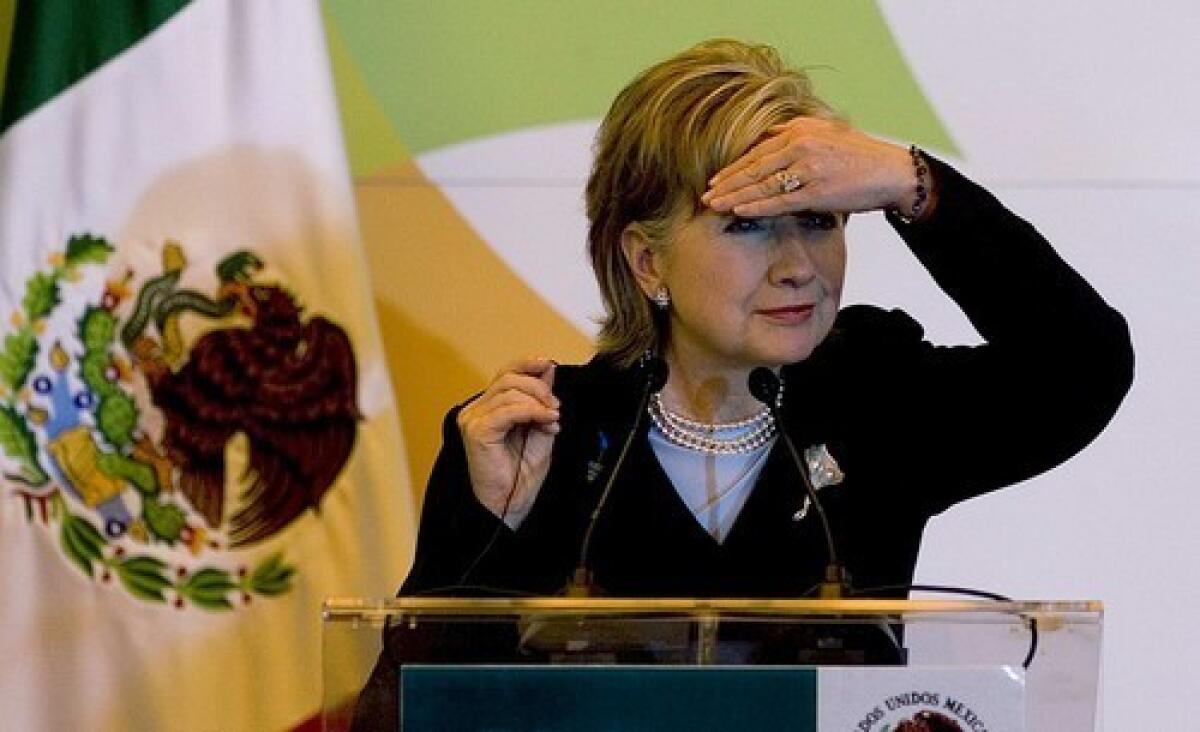U.S. shares blame for Mexico drug violence, Clinton says

- Share via
Reporting from Mexico City — In candid comments aimed at reassuring a sensitive neighbor, Secretary of State Hillary Rodham Clinton accepted Wednesday that the United States shares blame for Mexico’s drug violence, and promised more equipment and support to help the country’s war against traffickers.
Clinton said the U.S. has a duty to help since it is a major consumer of illicit drugs and a key supplier of weapons smuggled to cartel hit men.
“We know very well that the drug traffickers are motivated by the demand for illegal drugs in the United States, that they are armed by the transport of weapons from the United States to Mexico,” Clinton said during a news conference with Mexican Foreign Minister Patricia Espinosa. “We see this as a responsibility to assist the Mexican government and people.”
Mexico’s leaders are defensive over commentary in the United States suggesting that their nation is in danger of becoming a “failed state.” Mexican President Felipe Calderon two weeks ago labeled such talk as “false, absurd,” and challenged the United States to clean up its own act by curbing drug use and arms trafficking.
Calderon even wondered aloud whether a campaign to discredit the Mexican government was afoot.
Clinton used the opportunity of her first visit to Mexico as secretary of State to try to soothe those fears. On the trip down, she told U.S. reporters traveling with her that “our insatiable demand for illegal drugs fuels the drug trade.”
And she acknowledged that U.S. anti-drug policies have failed, noting that “clearly, what we have been doing has not worked and it is unfair for our incapacity . . . to be creating a situation where people are holding the Mexican government and people responsible.”
Once in Mexico City, she described Calderon’s 2-year-old war against drug-trafficking organizations as “courageous.”
In response, Calderon issued a statement urging that “binational cooperation in this area should be strengthened.”
The Obama administration is already taking some steps in that direction. Clinton said Washington hopes to provide $80 million worth of Black Hawk helicopters to Mexico. Some of the funds would come out of the $700 million already approved by Congress in security aid for Mexico under a three-year, $1.4-billion program called the Merida Initiative.
The Black Hawks would be in addition to five Bell helicopters already funded by the aid package. U.S. officials have said it could take until next year to deliver the five aircraft, prompting complaints from Mexican officials.
“We’re going to see what we can do to cut that time,” Clinton said during the news conference, after meeting with Calderon and Espinosa.
Clinton is to tour a police training facility today and travel to the northern city of Monterrey, a business hub that has also seen a big jump in drug-related violence.
Her two-day stopover is, in part, a customary get-acquainted call by the top diplomat of a new U.S. administration. But the visit comes at a delicate moment.
Mexico’s escalating drug violence, especially near the U.S. border, and a brewing trade dispute over cross-border trucking, have caused long-standing bilateral tensions to percolate.
A day before Clinton’s arrival here, the Obama administration announced that it would send hundreds of additional federal agents and intelligence analysts to the border to target drug cartels and keep the violence that has killed more than 7,000 people in Mexico in the last 15 months from spilling into the United States.
Skeptics on the U.S. side question whether the plan goes far enough to ensure that serious violence doesn’t cross the border. Mexican officials privately expressed doubt about whether the plan devotes enough resources to put a real dent in arms trafficking and money laundering.
At a hearing Wednesday in Washington, Sen. Joe Lieberman (I-Conn.) said he planned to request funding to boost resources and hire additional law enforcement and investigative personnel to work to halt the flow of drugs and guns across the southern border.
“The administration’s latest response to the southwest border violence represents a significant first step forward,” said Lieberman, chairman of the Committee on Homeland Security and Governmental Affairs.
“Our government is really mobilized, but it’s going to be a long fight.”
Mexico’s military-led offensive has roiled the country’s drug underworld, leading to gunfights between soldiers and hit men as well as brutal feuding between rival trafficking groups.
More than 6,000 people died in drug-related violence last year alone.
Mexican leaders have been irked by comments from Washington, including by the U.S. national intelligence director, Dennis C. Blair, suggesting that Mexico is losing ground to the criminal syndicates.
Clinton took issue with depictions of Mexico as a state in danger of collapse.
“I don’t believe there are any ungovernable territories in Mexico,” she said, “but I remember very well when we had such a crime wave 15, 20 years ago, there were many parts of cities in our country that people didn’t feel safe going to.”
Josh Meyer in our Washington bureau contributed to this report.
More to Read
Sign up for Essential California
The most important California stories and recommendations in your inbox every morning.
You may occasionally receive promotional content from the Los Angeles Times.










